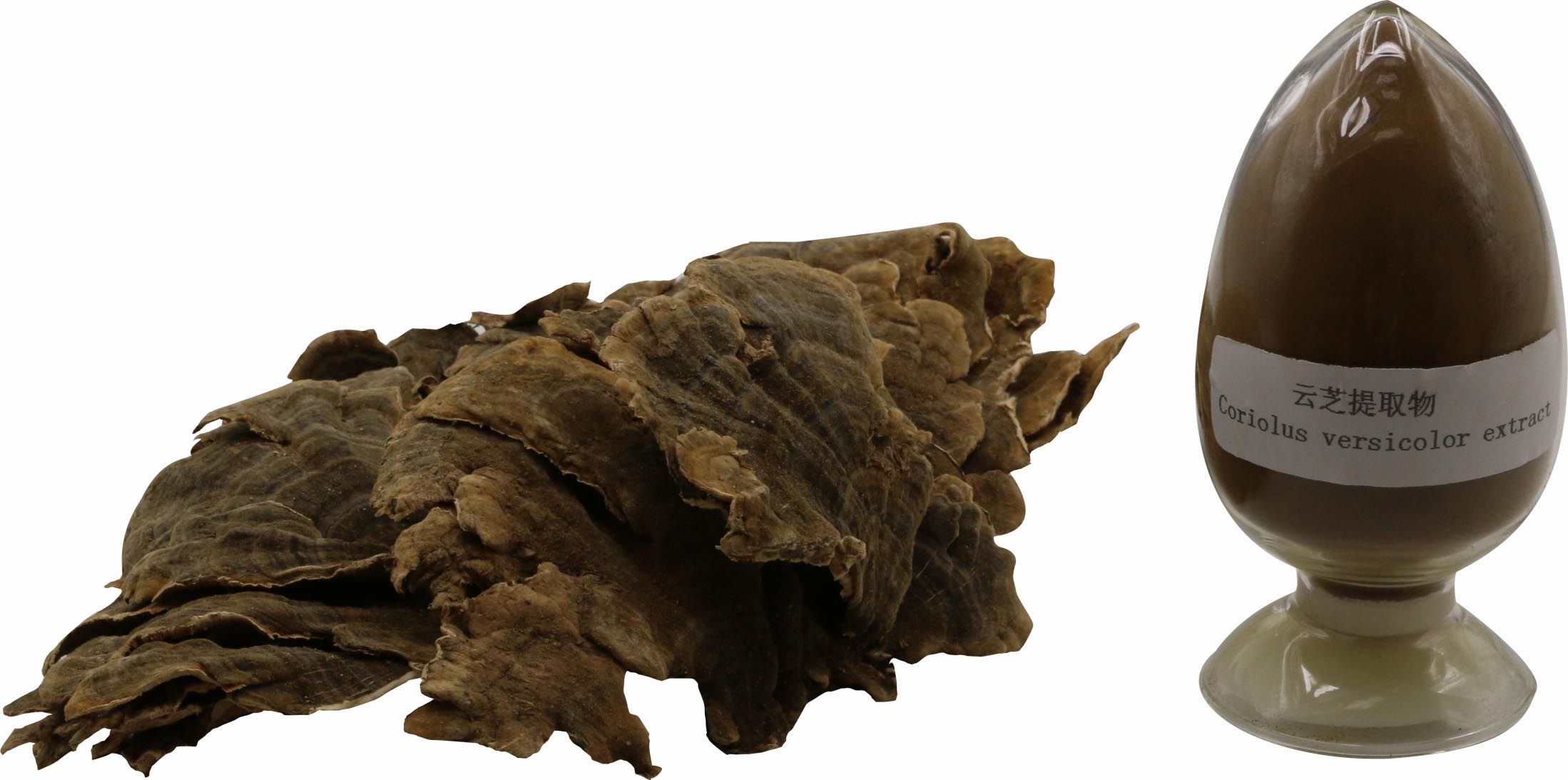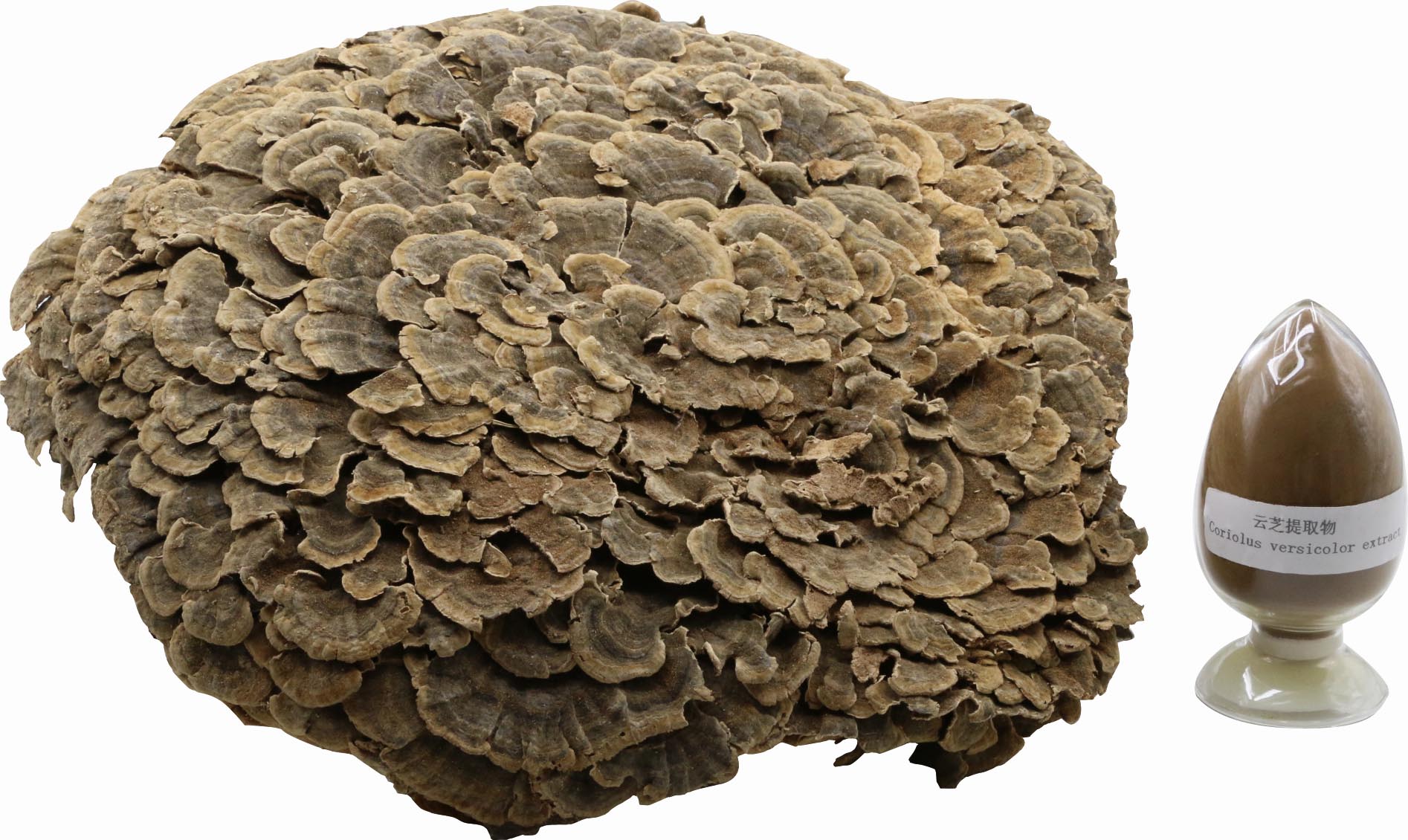Coriolus versicolor extract/Trametes versicolor extract/Polytictus vesicolor extract (Polysaccharide & Beta Glucan)

Coriolus versicolor (L.:Fr.) or Trametes versicolor or Polytictus vesicolor.
Commonly known as the "turkey tail" in North America, Coriolus versicolor (also known as Trametes versicolor), is unique among
the medicinal mushrooms, with extensive use in both traditional herbalism and modern clinical practice.The focus of the modern
clinical use and research (over 400 published studies), has been the immuno-modulating and anti-tumor properties of the hot
water extracted polysaccharides.* Originally isolated from the fruiting body (the mushroom), sales for these unique all-natural
compounds have reached several hundred million dollars a year in Japan and China, making them the most widely used products in those countries by people facing serious immune challenges.
Coriolus versicolor is found throughout the wooded temperate zones of North America, Asia, and Europe and may be the most
prolific shelf fungus in the Northern Hemisphere. The woody, shelflike fruiting bodies form dense, overlapping clusters on stumps, tree trunks, and fallen trees. The mushroom caps have a plush velvety surface and are colored in varying shades of brown or gray, with a distinctive pattern of alternating bands of dark and light color.
In Classical Chinese and Japanese herbalism the fruit bodies (mushrooms) are harvested, dried, ground to a powder and made
into tea. Given the extraction rate of the polysaccharides in a simple hot water extract (tea), it is interesting to note that the dose for
the active compounds is the same in both traditional medicine and modern clinical practice.
Coriolus versicolor polysaccharide
In traditional herbalism hot water extracts of Coriolus were used to dispel dampness, reduce phlegm, treat pulmonary infections,
and to support liver health. The Ming dynasty edition of the Materia Medica states that "The black and green Yun zhi are beneficial to one's spirit and vital energy, and strengthen one's tendon and bone. If Yun zhi is taken for a long time, it will make one vigorous and live long." In Japan these mushrooms are also highly prized and sought after by people suffering from a variety of cancers. It was
this popularity as a "folk remedy" that first got the attention of modern researchers.
Based on its reputation for healing within their traditional herbal practices Chinese and Japanese scientists began to do controlled clinical research on concentrated hot water extracts from Coriolus, studying the same 1-4, 1-3 polysaccharides (beta glucans) that would have been released into solution when making the hot water teas described in the texts from traditional Japanese and
Chinese herbalism.
After placebo controlled clinical research demonstrated significant immuno-modulating properties the Coriolus 1-4, 1-3
polysaccharides (beta glucans) were approved as a pharmaceutical product by the Japanese Health Ministry, allowing health
insurance to cover the cost of it's use.
At this point the Coriolus extract began to get widespread use by Japanese oncologists. Coriolus polysaccharides were used in
practice to support immune health after surgical treatment for various conditions and to support and protect immune health in
those patients receiving therapies where immune suppression is a prominent feature. Private and government sponsored
research continued to monitor the effectiveness of the highly concentrated Coriolus extract in placebo controlled multi-institutional
clinical studies, with the clinical evidence demonstrating significant immune benefit from daily use.
The Coriolus extract was so successful that the cost to Japan's national health insurance program reached almost a billion dollars a year. In an attempt to reduce expenditures the Health Ministry restricted the use of the Coriolus extract to those people most in
need, people receiving chemotherapy or radiation. Clinical research has consistently demonstrated the ability of Coriolus beta
glucans to double and even triple survival rates for people receiving chemotherapy and radiation.
GMO Status:This product is GMO free Irradiation: This product has not been irradiated Allergen: This product does not contain any allergen Additive: This product without the use of artificial preservatives,flavors or colors. |
| Character | Brown or brown yellow powder , Moisture absorption easily |
Polysaccharide content (Beta Glucans) | According to clients' order or with factory's spec.stored. |
| Test method | UV |
| Solubility | Can supply soluble extract powder with no precipitation |
| Heavy metal | As<1.0 ppm, Cd<1.0 ppm, Pb<2.0 ppm, Hg<0.1ppm, Total heavy metal<10.0 ppm |
| Sanitation | Bacteria<10000 cfu/g E.Coli ,Mite and Salmonella Negative. Mould<100 cfu/g |
| Loss on drying | ≤9% |
| Packaging | Packaging spec.:1 kg/bag,5kg/bag,25kg/bag. Packaging inner material:Two layers plastic bag or aluminum foil bag. Packaging outer material: Cardboard drum or Carton. |
| Condition of reserve | Airproof, 25°C,relative humidity within 50% |
| Shelf life | Two years |
The product comes from Chinese mushroom city and No.1 Ecological environment town of China—Qingyuan,where is our factory located.
We are GMP and HACCP factory with some GAP mushrooms planting base.
We are high-tech enterprises of China.
We have Food Sanitary Registration Certificate of Export Enterprise,which meets export food hygiene requirements.
Professional testing personnel and testing equipment,advanced production equipments.
Fangge High-tech R&D Centre of Fungi Deep Processing (The first centre in China).
We have been exporting our mushroom products to Europe,USA and South Asia for many years. |

